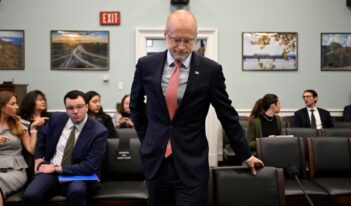
Experts debate whether the FCC is necessary to the information marketplace or a dangerous anachronism.
Last month, ABC briefly suspended “Jimmy Kimmel Live!” after two major broadcasters—Sinclair Broadcast Group and Nexstar—announced they would not broadcast the show. The broadcasters’ decisions followed Federal Communications Commission (FCC) Chairman Brendan Carr’s appearance on conservative pundit Benny Johnson’s podcast. During that appearance, Carr sharply criticized Kimmel’s comments regarding the assassination of right-wing commentator Charlie Kirk and jokes Kimmel made about conservative figures’ reactions to Kirk’s death. Some interpreted Carr’s statements as threats meant to pressure ABC to punish Kimmel for his comments. ABC, Nexstar, and Sinclair all have major deals pending FCC or federal antitrust approval.
Nexstar and Sinclair maintain that their decision to preempt Kimmel’s show was made independently of the FCC. Kimmel’s show was reinstated days later.
The incident has renewed debate about the FCC’s role in regulating speech and the practice of “jawboning.” Jawboning refers to the use or threat of government power to coerce private actors to take steps that the government cannot legally take itself.
Complaints of jawboning cut across ideological lines. In 2022, then FCC Commissioner Carr publicly opposed the practice. And, in September 2025—around the time of the Kimmel jawboning controversy—new evidence emerged that the Biden Administration may have pressured Google and its subsidiaries to silence certain views about COVID-19 and the 2020 election.
The FCC both licenses portions of the broadcast spectrum to public and private entities and polices certain categories of content broadcast on those channels. License recipients must serve “the public interest, convenience or necessity.” Federal law and FCC rules prohibit obscene broadcasts and restrict indecent and profane content during hours when children are likely to be watching. The FCC may fine broadcasters up to $3 million per year for distributing indecent materials. The agency’s power to enforce public interest and obscenity standards is restrained by section 326—part of the Communications Act, which denies the FCC “the power of censorship” and forbids rules that “interfere with the right of free speech.”
Despite these restrictions, the FCC’s power to punish or promote speech remains significant.
These relatively strict broadcast regulations contrast sharply with the more permissive scheme regulating social-media and other internet content distributors. Under another provision of the Communications Act, section 230, internet media providers are treated as platforms, not publishers, and are generally shielded from civil liability stemming from their content moderation policies—or lack thereof—and the content posted on their websites.
Some commentators question the logic of regulating broadcasters and internet media providers differently, given they serve the same market need for up-to-date information and compete with one another directly. In response to this paradox, some urge broadcast content rules be pared back in favor of a more speech-protective approach akin to section 230. Others argue that section 230 is too lax, allowing the propagation of disinformation and misinformation, and that social-media regulation should be brought in line with stricter broadcast regulation.
In today’s Saturday Seminar, media policy experts debate the direction and merits of FCC reform.
- In a research paper for the Northwestern University Pritzker School of Law Public Law and Legal Theory Series, Northwestern professor James B. Speta argues that existing rules prevent the FCC from punishing broadcasters for their viewpoints. He explains that the Communications Act’s public-interest standard does not authorize license denials or cancellations based on political speech, and that the First Amendment forbids using licensing leverage to silence critics. Distinguishing older broadcast cases, he points to FCC v. League of Women Voters and recent coercion doctrine to show that even threats of adverse action can cross constitutional lines. Speta maintains that regulators may disagree with broadcasters’ messages, but they cannot punish them for their viewpoints.
- In a forthcoming University of Chicago Law Review article, the University of Chicago Law School’s Genevieve Lakier argues that the Supreme Court’s decision in NRA v. Vullo reasserts the categorical rule against informal governmental coercion of speech. Lakier argues that this holding brings coherence to fractured lower court interpretations on informal censorship doctrine and provides a pathway toward stronger judicial speech protections. She details a long history of jawboning, featuring myriad forms of informal speech restrictions she believes are barred under Vullo—including threats of selective regulation directed at social-media companies and conditioning university grants on speech policing. Lakier urges courts and legislatures to give Vullo’s prohibitions teeth, by creating meaningful remedies—including statutory damages—and lowering standing hurdles.
- In a Cato Institute briefing paper, Cato adjunct scholar Andrew M. Grossman and Independent Women’s Forum senior fellow Kristin Shapiro propose a disclosure regime to address government pressure on private companies to restrict lawful speech. Grossman and Shapiro contend that prohibitions on government action fail to address jawboning because they are either underinclusive—missing subtle pressure—or overly broad—catching routine government speech. The authors argue that requiring federal employees to report speech-related requests to private entities, followed by public summaries, user notifications, and penalties for noncompliance, would deter covert censorship while avoiding overly broad prohibitions. Grossman and Shapiro explain that transparency would bring hidden influence to light, help courts review coercive practices, and make future First Amendment challenges stronger.
- In an article in the North Carolina Journal of Law & Technology, Jiawei Zhang, a practitioner and doctoral candidate at the Technical University of Munich, argues that inconsistent interpretations of the FCC’s vague public interest standard create regulatory uncertainty. Zhang contends the FCC’s focus has naturally shifted as spectrum scarcity has diminished, moving from content policing to maintaining market competitiveness. To resolve legal ambiguity around the public interest standard, Zhang proposes the FCC embrace this market-focused role. He endorses an economic view of public interest centered on ensuring information access and diversity in media ownership. Under this framework, conduct-based regulations—such as must-carry rules—would be justified only when a firm’s market power is great enough to handicap media competition.
- In a Chamber of Progress report, the Chamber’s Director of Civic Innovation Policy, Hope Ledford. contends the Trump Administration is unlawfully weaponizing the FCC and FTC, undermining platforms’ right to self-moderate under section 230. Ledford argues weakening section 230 may flood the internet with harmful content, eroding the informational and free speech potential of online spaces. She highlights Supreme Court rulings, including Moody v. NetChoice, affirming platforms’ editorial discretion and rejecting state efforts to compel them to host disfavored speech. Ledford warns that FTC attempts to recast platform’s self-moderation as “unfair or deceptive” exceed authority and would chill essential curation. Finally, Ledford urges defending section 230 to prevent politicized control of online discourse and preserve a healthy, competitive internet.
- In an article in the Rutgers University Law Review, practitioner Chancelor Wahl argues for a broader understanding of the public interest which would allow the FCC to leverage its broadcast licensing authority to combat misinformation. Wahl contends that Fox News’ dissemination of election fraud conspiracy theories contributed to civil unrest at the U.S. Capitol on January 6, 2021, and violated the FCC’s public interest standard for broadcast licensees. Drawing on the FCC’s historical role in advancing civil rights protections through creative interpretation of its statutory mandate, Wahl proposes that the agency deny or restrict certain FOX affiliates’ license renewals, establishing that knowingly broadcasting false information undermines democratic discourse and exceeds First Amendment protections.
The Saturday Seminar is a weekly feature that aims to put into written form the kind of content that would be conveyed in a live seminar involving regulatory experts. Each week, The Regulatory Review publishes a brief overview of a selected regulatory topic and then distills recent research and scholarly writing on that topic.



